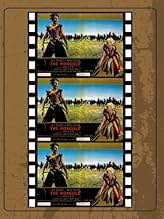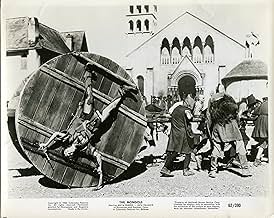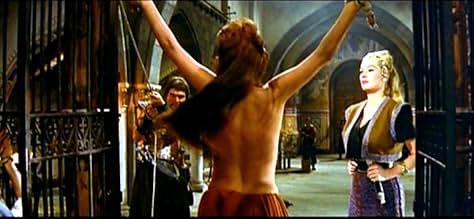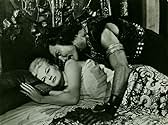Während der mongolischen Invasion in Polen kommt es zu einem Konflikt zwischen dem Mongolenkaiser Dschingis Khan und seinem ältesten Sohn Ogotai, als ersterer Frieden schließen will.Während der mongolischen Invasion in Polen kommt es zu einem Konflikt zwischen dem Mongolenkaiser Dschingis Khan und seinem ältesten Sohn Ogotai, als ersterer Frieden schließen will.Während der mongolischen Invasion in Polen kommt es zu einem Konflikt zwischen dem Mongolenkaiser Dschingis Khan und seinem ältesten Sohn Ogotai, als ersterer Frieden schließen will.
Lawrence Montaigne
- L'aleato di Stefano
- (as Lawrenc Montaigne)
Mario Colli
- Boris
- (Nicht genannt)
Andrej Gardenin
- Fencer
- (Nicht genannt)
Janine Hendy
- La danzatrice nell'harem
- (Nicht genannt)
Empfohlene Bewertungen
As many other American directors, Andre De Toth finished his career in Europe; this movie seems to be a response to Richard Thorpe's THE TARTARS, produced the same year, and starring Victor Mature and Orson Welles. Rudolph Maté, Hugo Fregonese, Vincent Sherman, Edgar G Ulmer, and many other film makers finished their filmographies in Italy or Spain. This one is a pretty good one, offering splendid settings, good pace, good scenes, a gorgeous Anita Ekberg as a villainess whom you won't forget. I saw it for the first time when I was just thirteen and have never forgotten it. I like this Andre De Toth's movie.
This was one of a number of low-brow peplums about ancient warrior tribes made in the wake of THE VIKINGS (1958) – this one even boasted a similarly rousing score by that film’s same composer, Mario Nascimbene. Others in this vein included THE COSSACKS (1960), THE TARTARS (1961) and ATTACK OF THE NORMANS (1962) – the latter being the only one in the bunch that I’ve watched, though I did lose the first one a couple of times on Italian TV.
Actually, this one turned out to be pretty good – and, I have to say, it lived up to the review on “Stracult” where special reference is made to its sequences of bloodthirsty action and sadism. Jack Palance gives the role of Ogotai – son of Asian potentate Genghis Khan – his eye-rolling all; he’s abetted by an equally evil Anita Ekberg (the mighty but battle-weary Khan himself perishes by her hand!). The unhistorical narrative involves the Mongols’ raid of Poland and, in particular, the attempts by one of the latter’s leading figures (Franco Silva) to negotiate a peace treaty with the Khan – a plan which Palance vehemently opposes and constantly schemes to thwart.
Being a relatively low-budget effort, the triple directorial credit might seem surprising: however, as the Italian credits themselves clearly indicate, this translates to being “A Film by Andre' De Toth” (implying that he was merely engaged in a supervisory capacity), “Directed by Leopoldo Savona”, and “Battle Sequences Staged by Riccardo Freda”. With this in mind, there are fewer of the latter than one would perhaps have appreciated – but these are nonetheless handled with the requisite gusto and grandeur. The rest of the film is largely taken up by various court intrigues on both sides of the fence but also a three-way Polish romance involving the aforementioned Franco Silva, Antonella Lualdi and Pierre Cressoy that tends to swamp Palance’s troubled relationship with his own wife!
As I said, the violence is really at the fore in this film – the Mongols themselves are memorably introduced on horseback dragging a statue of the Virgin Mary through the streets of a Polish city they’d just ransacked; besides, there are plenty of floggings (Ekberg herself lends a hand in the punishment of the perennially imperiled Lualdi), crucifixions (two men are even tied to the wheels of an advancing cart!), burnings at the stakes, etc. The finale, then, sees an Alexander NEVSKY (1938)-type strategy at work with the apparently fleeing Silva and his men luring the pursuing Mongol forces into a deadly swamp. The film was good enough almost to merit a *** rating from me…but, at 115 minutes, it’s quite a long haul – especially since it resorts too often to contrived (and repetitive) plotting.
Actually, this one turned out to be pretty good – and, I have to say, it lived up to the review on “Stracult” where special reference is made to its sequences of bloodthirsty action and sadism. Jack Palance gives the role of Ogotai – son of Asian potentate Genghis Khan – his eye-rolling all; he’s abetted by an equally evil Anita Ekberg (the mighty but battle-weary Khan himself perishes by her hand!). The unhistorical narrative involves the Mongols’ raid of Poland and, in particular, the attempts by one of the latter’s leading figures (Franco Silva) to negotiate a peace treaty with the Khan – a plan which Palance vehemently opposes and constantly schemes to thwart.
Being a relatively low-budget effort, the triple directorial credit might seem surprising: however, as the Italian credits themselves clearly indicate, this translates to being “A Film by Andre' De Toth” (implying that he was merely engaged in a supervisory capacity), “Directed by Leopoldo Savona”, and “Battle Sequences Staged by Riccardo Freda”. With this in mind, there are fewer of the latter than one would perhaps have appreciated – but these are nonetheless handled with the requisite gusto and grandeur. The rest of the film is largely taken up by various court intrigues on both sides of the fence but also a three-way Polish romance involving the aforementioned Franco Silva, Antonella Lualdi and Pierre Cressoy that tends to swamp Palance’s troubled relationship with his own wife!
As I said, the violence is really at the fore in this film – the Mongols themselves are memorably introduced on horseback dragging a statue of the Virgin Mary through the streets of a Polish city they’d just ransacked; besides, there are plenty of floggings (Ekberg herself lends a hand in the punishment of the perennially imperiled Lualdi), crucifixions (two men are even tied to the wheels of an advancing cart!), burnings at the stakes, etc. The finale, then, sees an Alexander NEVSKY (1938)-type strategy at work with the apparently fleeing Silva and his men luring the pursuing Mongol forces into a deadly swamp. The film was good enough almost to merit a *** rating from me…but, at 115 minutes, it’s quite a long haul – especially since it resorts too often to contrived (and repetitive) plotting.
For those of you who got a kick out of Mr. Palance's Attila the Hun in SIGN OF THE PAGAN this film gives you a better, new improved version of his unique brand of barbarity. This man's GOT to have a war or he'll just be miserable. He'll lie, cheat, steal, connive- do just anything in order to HAVE THAT WAR. This is type A personality taken to it's most outer extreme. You can really feel the almost unbearable frustration he seems to experience when his old dad Genghis Khan tells him that they're going to try for a peaceful solution with the Poles. Well, anyhow, it all ends badly for Jack (and dad). Anita Ekberg as a truly ice cold partner/lover of Jack's is fascinating to watch as well in a sort a somnambulistic way; she's pure deceit. And I was also rather entranced by the head Polish knight's seeming death wish in his relentless, driven fixed idea of obtaining peace with the Mongols. Discouraged at almost every turn, the son of a gun just would not give up and finally came out on top in the end (and got the girl, too). A good lesson in superhuman determination.
When Jack Palance signed on to do The Mongols an Italian produced epic shot in Yugoslavia he merely took out his former performance of as Attila The Hun ratcheted it up exponentially. When you're in a turkey like this all you can do is gobble gobble at the moon.
The only names we Americans will recognize are that of Palance playing Ogatai son of Genghis Khan and his lovely blond amazon wife played by Anita Ekberg. I will say this the writers did make provision for the fact that she clearly does not look like a Mongol and did mention that she was from a captive people. Perhaps a Viking settlement somewhere in Eastern Europe might explain it. I'll say this with that massive endowment of her's Anita looks good even in that Mongol armor. One fill figured girl she was.
When Palance is on there isn't a stick of furniture left standing. He is having one great old time overacting against the background of these continental cast members who sound stiff as usual with their dubbed voices. The Europeans have decided to sue for peace and have sent the film's nominal hero Franco Silva playing Stephen of Cracow as a peace emissary.
But Palance really gets his jollies with all the blood and guts and he doesn't want to stop the fighting. In this he's aided and abetted by Anita. So nice when husband and wife have a mutual interest. He and Anita do what they can to sabotage a cease fire.
In the end it's pulled out and western civilization itself is saved by a seasoned soldier taking home town advantage of the elements.
Jack Palance fans should get a real charge out of this film watching their guy dine on the scenery. The Mongols will give you quite a few unintentional laughs.
The only names we Americans will recognize are that of Palance playing Ogatai son of Genghis Khan and his lovely blond amazon wife played by Anita Ekberg. I will say this the writers did make provision for the fact that she clearly does not look like a Mongol and did mention that she was from a captive people. Perhaps a Viking settlement somewhere in Eastern Europe might explain it. I'll say this with that massive endowment of her's Anita looks good even in that Mongol armor. One fill figured girl she was.
When Palance is on there isn't a stick of furniture left standing. He is having one great old time overacting against the background of these continental cast members who sound stiff as usual with their dubbed voices. The Europeans have decided to sue for peace and have sent the film's nominal hero Franco Silva playing Stephen of Cracow as a peace emissary.
But Palance really gets his jollies with all the blood and guts and he doesn't want to stop the fighting. In this he's aided and abetted by Anita. So nice when husband and wife have a mutual interest. He and Anita do what they can to sabotage a cease fire.
In the end it's pulled out and western civilization itself is saved by a seasoned soldier taking home town advantage of the elements.
Jack Palance fans should get a real charge out of this film watching their guy dine on the scenery. The Mongols will give you quite a few unintentional laughs.
It makes me laugh . Genghis Khan don't die by the hand of his daughter in law in Poland he died from burbonic plague in China. The Mongol Empire beat the crap out of polish and hungarian and they reach Wien.in 1241 , 14 years after Geghis Khan died. When his son. Ogotai dies the invasion has stopped, , Poland never be an obstacle in front of.anybody. Stepen of Crakow it's an invented personage , he never existed. Mongols never suffer a defeat like americans never had a win or a neuron .As a fiction movie it's an easy to watch movie with gorgeous Anita Ekberg.and Antonella Lualdi , but has nothing to do with reality like western media nowdays.
Wusstest du schon
- WissenswertesPopularized by John Green's Crash Course YouTube series (three-second raid scene) every time he uses the phrase "The Mongols".
- PatzerDuring an invasion of the Mongols a character is seen dressed in a sleeveless jacket defending another nailed to a wheel. Ogotai (Jack Palance) drags him down with his whip, only this time the character has lost his sleeveless leather jacket, and is wearing only a wide shirt.
- VerbindungenFeatured in Crash Course: World History: The Agricultural Revolution (2012)
Top-Auswahl
Melde dich zum Bewerten an und greife auf die Watchlist für personalisierte Empfehlungen zu.
- How long is The Mongols?Powered by Alexa
Details
- Erscheinungsdatum
- Herkunftsländer
- Sprachen
- Auch bekannt als
- The Mongols
- Drehorte
- Produktionsfirmen
- Weitere beteiligte Unternehmen bei IMDbPro anzeigen
- Laufzeit
- 1 Std. 55 Min.(115 min)
- Seitenverhältnis
- 2.35 : 1
Zu dieser Seite beitragen
Bearbeitung vorschlagen oder fehlenden Inhalt hinzufügen




















